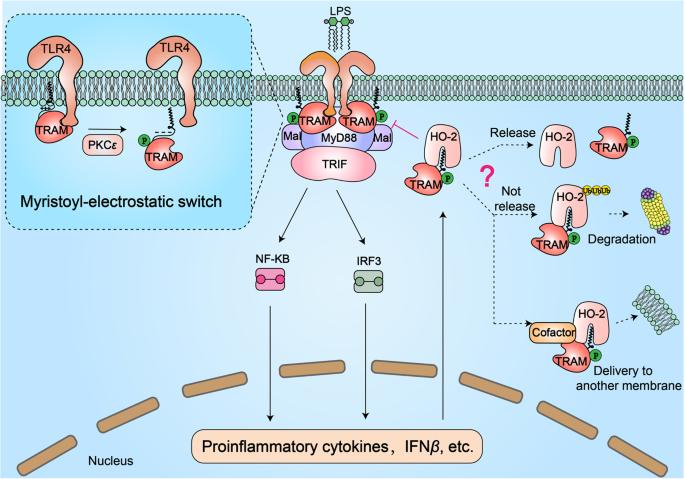Myristoylation Analysis Service
As a lipid acylation modification of proteins, myristoylation promotes signal transduction, protein stability, and membrane localization, as well as immune response regulation. Creative Proteomics offers high-quality myristoylation analysis services, including identification, quantification and characterization of protein myristoylation modifications, providing valuable insights into your protein research.
What is Myristoylation
Protein myristoylation is a crucial post-translational modification (PTM) that involves the covalent attachment of a myristoyl group—derived from myristic acid—to the N-terminal glycine residue of a protein. This modification is catalyzed by N-myristoyltransferase (NMT) enzymes and plays a pivotal role in modulating various cellular processes. Myristoylation facilitates the association of proteins with cellular membranes, influencing their localization, stability, and function.

Fig.1 Schematic of myristoylation (Wang, B. et al.; 2021)
The myristoyl group is a 14-carbon saturated fatty acid that confers hydrophobic properties on the modified protein. This hydrophobicity is instrumental in targeting proteins to cellular membranes, such as the plasma membrane or intracellular organelles. The myristoyl moiety inserts itself into the lipid bilayer, anchoring the protein and facilitating its interaction with membrane-bound components. Importantly, myristoylation is irreversible and occurs co-translationally, meaning it takes place during protein synthesis. The specificity of NMT for its substrates ensures precise regulation of myristoylation events within the cell.
Applications of Myristoylation Analysis
Cell Signaling Study
Its role in signaling pathways, particularly in the regulation of G-proteins and kinases, underscores its significance in cellular communication.
Cancer Research
Inhibition of NMT has been explored as a strategy to disrupt the membrane association of oncoproteins, hindering their function and potentially impeding tumor progression.
Disease Research
It has profound implications for various cellular processes and is implicated in several diseases. Moreover, myristoylation is a target for therapeutic interventions, with potential applications in cancer and viral infections.
Drug Development
Understanding the principles of protein myristoylation opens avenues for targeted drug development and sheds light on the intricate mechanisms governing cellular function.
Our Service
Creative Proteomics has advanced protein detection technologies and can provide customized services to researchers and scientists to help them reveal the complexity of PTM using powerful mass spectrometry technologies. Our services are thoughtful and detailed and the process of myristoylation analysis service is as follows:

Fig.2 Myristoylation analysis workflow
- Sample Preparation
Proper extraction and preparation of proteins from biological samples to ensure preservation of myristoylated proteins. - Myristoylation Enrichment
Enrichment techniques are employed to isolate myristoylated proteins or peptides. This step is crucial as myristoylation modifications are often present in low abundance compared to unmodified proteins. - Detection
WB, protein microarrays and LC-MS/MS are powerful tools for the identification and quantification of myristoylated peptides, and they provide detection information that facilitates a comprehensive analysis of myristoylation. - Bioinformatics Analysis
Advanced bioinformatics tools are used to analyze data, identify myristoylated peptides, and map these modifications to protein sequences. - Result Delivery
After professional data analysis, we deliver results quickly and consistently.
Creative Proteomics brings a wealth of experience to the field of protein research. Our comprehensive services and products cover the entire spectrum of utilizing suitable and efficient gateways. Utilizing our proprietary platform, we have successfully implemented many proteomics research projects. If you are interested, please contact us for more information and a quote.
Reference
- Wang, B.; et al. Protein N-myristoylation: functions and mechanisms in control of innate immunity. Cellular & Molecular Immunology. 2021, 18(4): 878-888

